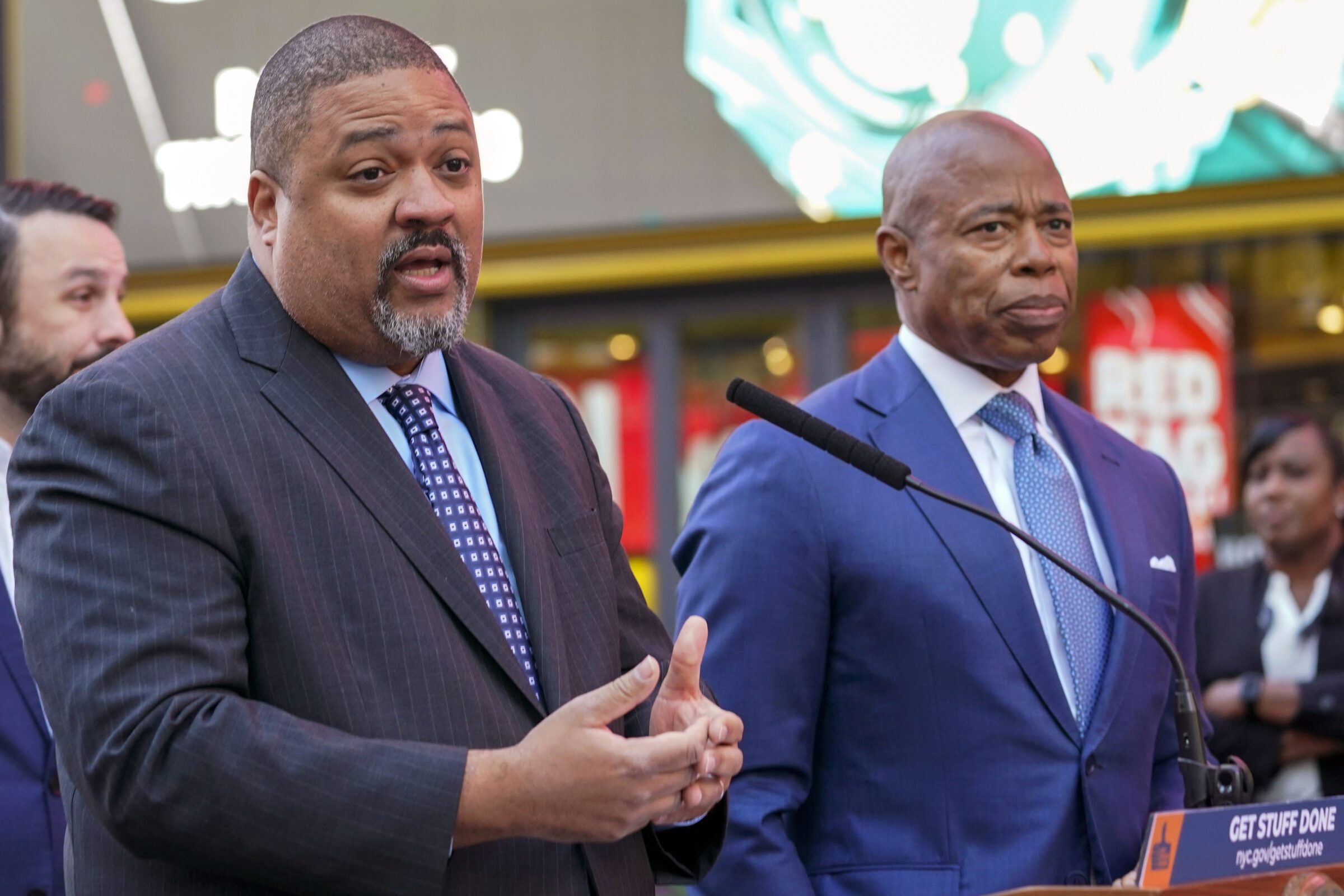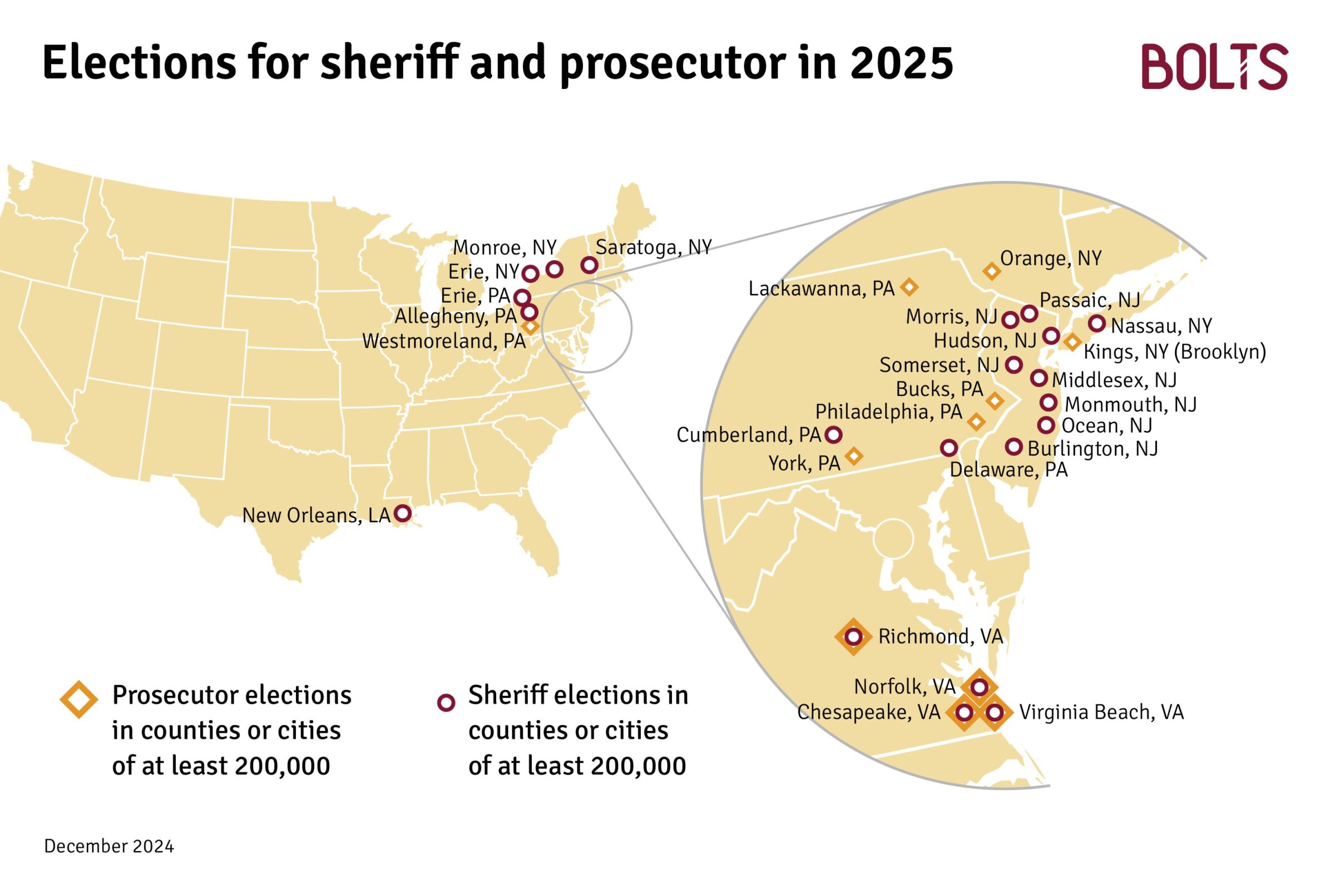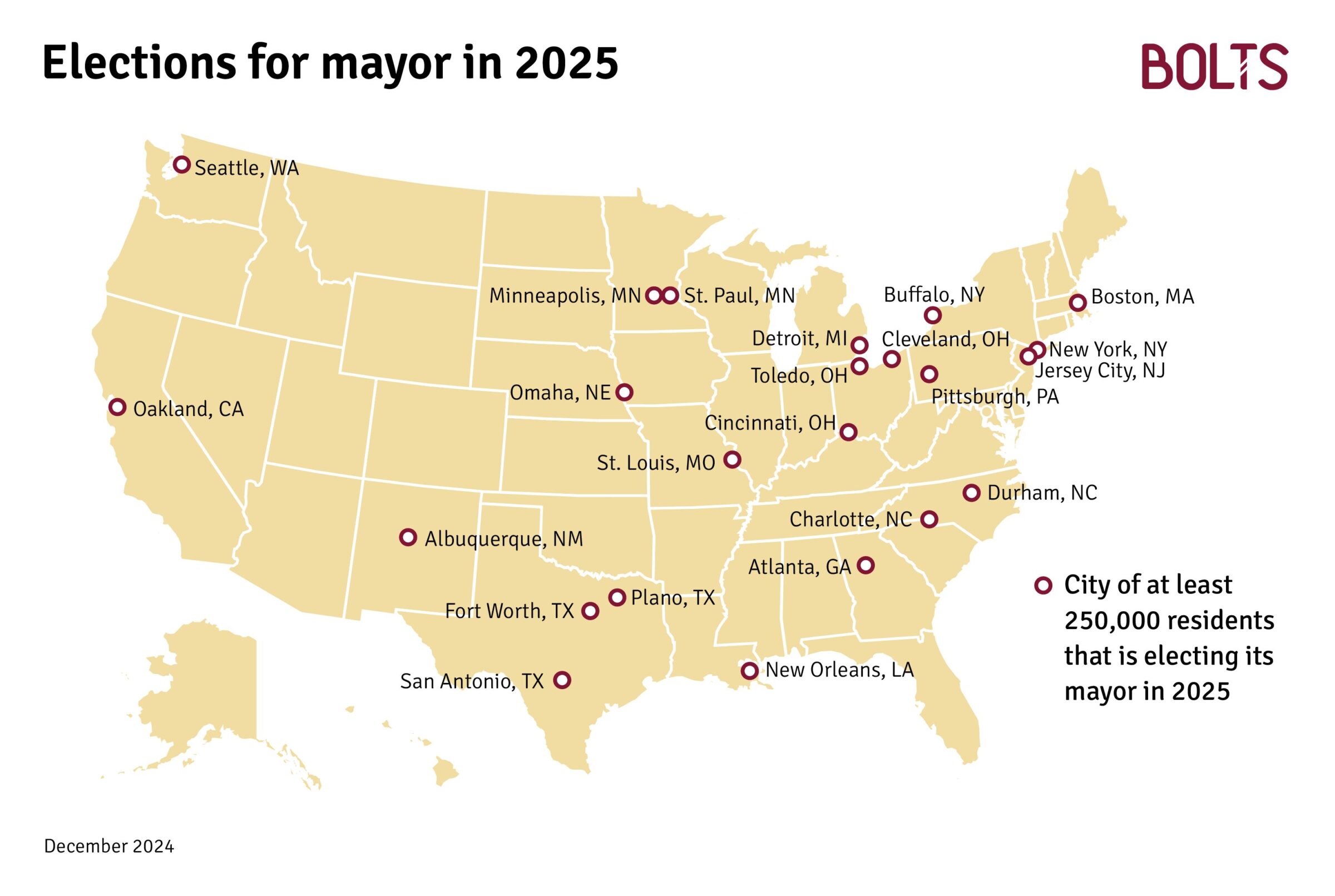The Local Elections That Will Define Criminal Justice Policy in 2025
Big-city mayor, prosecutor, and sheriff elections this year could carry high stakes for policing and punishment.
| January 7, 2025

As executive director of the New Jersey Alliance for Immigrant Justice, Amy Torres cheered on state officials in recent years for passing new protections to shield immigrants from arrest and detention. In 2019, she supported the Democratic attorney general’s directive to restrict how local law enforcement can partner with federal immigration services. Then two years later, she watched as New Jersey lawmakers banned public and private contracts for immigration detention in the state.
But now Torres is nervous about what 2025 may bring. A lawsuit threatens to unwind the law against immigration jails, and the attorney general’s directive is still not codified into law, meaning that a new official who is more hostile to immigrants’ rights could quickly undo it. And New Jersey is electing many of its state and local leaders this year in a host of races that will test much more than just candidates’ openness to immigration detention.
“Somehow I have been dreading 2025’s cycle for even longer than I did 2024’s,” Torres told Bolts about New Jersey’s upcoming elections. “It’s not guaranteed that we’re going to get the protections that these communities deserve.”
The coming year indeed carries high stakes for policing and criminal justice, in New Jersey and beyond. There will be roughly 160 elections for prosecutor and sheriff this year. Most are concentrated in just four East Coast states—New Jersey, New York, Pennsylvania, and Virginia.
Filing deadlines are still months away. But at this early juncture, there are already several elections to keep an eye on including the re-election bids of Philadelphia DA Larry Krasner, the former civil rights attorney turned prosecutor, and Manhattan DA Alvin Bragg, fresh off prosecuting Donald Trump. This year will also see important elections for prosecutor in Brooklyn and several Virginia cities, as well as sheriff races in Buffalo and New Orleans. (The full list of prosecutor and sheriff races is available here.)

Sheriffs and prosecutors are central to local criminal legal systems, with wide discretion over a large range of issues from sentencing to detention conditions, so Bolts closely tracks them each year. But criminal justice policy also hinges on offices that have broader purviews. This year, New Jersey and Virginia are selecting their state governments. The partisan or ideological majorities on Pennsylvania and Wisconsin’s supreme courts are also on the line.
Plus, dozens of cities are electing their mayors and city councilors in 2025, including places with major recent conflicts over policing like Atlanta, Minneapolis, and New York City.
Today Bolts is launching its coverage of these races by fleshing out six storylines that will define the cycle.
1. How will two prosecutors emblematic of the reform movement fare against national headwinds?
Alvin Bragg, the Manhattan DA who brought Trump to trial this spring on felony charges of falsifying business records, famously secured 34 convictions against him. With Trump now headed back to the White House, this may well remain the only criminal trial Trump sits through.
This has earned Bragg the intense enmity of conservatives nationwide, who have attacked his prosecution of Trump, as well as his affinities for criminal justice reforms. In 2024, a Republican prosecutor in Arizona even refused to extradite a suspect to New York, citing Bragg’s politics. When he first ran in 2021, Bragg positioned himself as a reformer and courted progressive voters, though his proposals were not as far-reaching as some of his rivals.
MAGA fury is unlikely to mean much in a Democratic primary in Manhattan, which is the main hurdle standing between Bragg and a second term this year. Despite the New York Post’s negative coverage of Bragg as responsible for crime, he has touted the decline in shootings, homicides, and property crimes in the borough over his time in office.
And some local progressives have distanced themselves from his policies. Eliza Orlins, a public defender who ran for DA against Bragg in the 2021 Democratic primary, has criticized him for breaking his campaign promises to scale back the tactics that ballooned incarceration locally, such as heavy prosecution of low-level offenses. “The political landscape has shifted significantly since 2021,” she told Bolts. “However, I think there’s still room to shape the debate—especially in races like the one for Manhattan DA,” she added. “Reformers need to push back against the fear-based narratives and ensure that the real impact of policies like bail reform and decarceration is part of the conversation.”
Just 100 miles away, in Philadelphia, Larry Krasner came to embody the “progressive prosecutor” movement after his 2017 victory. He curtailed prosecutions of low-level offenses, restricted the scope of probation, overturned many wrongful convictions, and clashed with police unions for taking a harder line on officer misconduct.
Krasner also comfortably won reelection four years ago despite a major push to oust him, and then also survived a GOP effort to remove him from office. However, as he now approaches his second reelection race, the national context has changed. Losses by high-profile reform DAs in California have put progressives interested in prosecutor reform on the defensive. Krasner may also face several challengers this year, including local judge Patrick Dugan, who recently divulged that he plans to run.
Heavy spending against California reformers by the tech and real estate industry was a key factor in their losses in the state. And Krasner might have an even bigger target on his back: Last fall, he tried to stop Elon Musk’s electioneering schemes on Trump’s behalf in Pennsylvania. Musk has recently said he wants to fund campaigns against reform DAs, and he spent heavily in a failed effort to oust Austin’s chief prosecutor last year, fueling speculation of new confrontations between Musk and Krasner this year.
2. Can proponents of prosecutor reform keep or expand their footing in New York, Pennsylvania, and Virginia? (Plus, who will even run?)
Even if the other prosecutors on the ballot this year don’t have such national profiles, their fates still matter for local criminal justice policy.
DA Eric Gonzalez is also up for reelection in Brooklyn, which is the biggest county with a prosecutor race anywhere in the nation this year. A self-proclaimed ‘progressive prosecutor,’ Gonzalez has unveiled policies to shield some immigrants from deportation and dropped cases against hundreds of against sex workers, among other reforms, while also facing criticism from the left for not being bold enough. He ran for a second term unopposed in 2021.
In upstate New York, reformers in 2024 got rid of David Soares, one of their more vocal foils. Soares spent years railing against pretrial reforms as DA of Albany County and former president of the state’s DA association. Reformers have a similar opportunity in 2025 in Orange County, where David Hoovler, another former president of the DA association and critic of pretrial reforms, is up for reelection. Also on the ballot are Nassau County DA Anne Donnelly and Suffolk County DA Raymond Tierney, two Republicans who oversee Long Island’s two populous counties and keep calling for the state to roll back its 2020 bail reform.
In Virginia, a group of 11 reform-minded prosecutors formed an alliance in 2020 to advocate for statewide criminal justice reforms like ending mandatory minimum sentences. But the group’s agenda was sidelined when Democrats lost their governing majority in late 2021.
Several members of this alliance face reelection in 2025. They include Stephanie Morales, the Portsmouth prosecutor who helped spearhead the creation of the reform alliance five years ago and who clashed with police during Black Lives Matter protests of 2020, as well as Ramin Fatehi, the Norfolk prosecutor who faces critics who favor a more punitive approach to prosecution. If they survive this year, they could reprise their statewide advocacy, but that could also hinge on Democrats regaining control of the state government (more on that below).
Finally, roughly a third of Pennsylvania’s counties are electing their DA, including populous Bucks, Westmoreland, and York counties. As is often the case with prosecutors, the first test will be who even files by the March deadline; in the state’s most recent DA races, in 2023, most races saw a complete lack of competition, with candidates running unopposed across the state.
3. Will sheriff races question the harsh status quo on jail deaths, detention conditions, and collaboration with ICE?
The jail in Buffalo, New York, has drawn lawsuits and scrutiny for the mounting deaths of people in custody. When longtime Erie County Sheriff Tim Howard, a named defendant in these lawsuits, retired in 2021, his preferred candidate, Republican John Garcia, narrowly prevailed in the race to replace him. Deaths have steadily continued in the lock-up under Garcia, and local activists say detention conditions have remained just as gruesome as under Howard.
In the city of Virginia Beach, an investigation conducted this fall revealed that a man died earlier this year due to the way in which he was restrained by sheriff’s deputies.
And in Monmouth County, New Jersey, the sheriff’s office was hit by a lawsuit in 2024 that alleged that it was covering up drug-related deaths and overdoses in custody.
Each of these three jurisdictions is electing its sheriff this year, which could at least give local advocates a platform to further expose these detention conditions. And similar questions could surface in the other sheriff’s races taking place in New York and Virginia, plus parts of New Jersey. (Note that Pennsylvania also votes for sheriffs but in that state, as well as in some New Jersey counties, jails are run by the county board and the sheriff’s authority is much more narrow.)
Local detention conditions are also worrying advocates in Louisiana, which adopted legislation last year that is set to balloon local jails. New Orleans, which has a long history of deadly conditions, is the only parish to hold a sheriff’s race this year. Sheriff Suson Hutson, who won with the support of many local reformers in 2021, broke with the other state sheriffs who cheered the 2024 legislation and warned that it would create an “unmanageable population explosion in the New Orleans jail.”
Sheriffs who run jails also have leeway in deciding how much to collaborate with federal immigration agents; for instance, many get to decide whether to rent out their space to ICE to detain people. Amy Woolard, chief program officer of the ACLU of Virginia, who is tracking how this issue plays out across her state’s 38 sheriff’s races this year, says it’s often difficult to even ascertain where sheriff candidates stand on it.
“I would ask them, point blank, what are their policies and practices for working with ICE; what are their intentions around protecting immigrant communities in their jurisdictions” Woolard told Bolts. “I think having that knowledge is going to help immigrant communities understand what they may be facing depending on where they live.”
4. How will city elections impact policing?
This year, 23 cities of at least 250,000 people will elect their mayor, a position that often comes with some control over the local police department.

The most obvious highlight is the mayoral race in New York City, where incumbent and former police officer Eric Adams is preparing to run for a second term while under indictment on federal corruption charges.
Under Adams, the New York Police Department has been rocked by incessant scandals and resignations, including over corruption and sexual misconduct allegations. Adams has championed more aggressive police tactics such as adding armed officers to public transit and reviving plainclothes police squads. He has already drawn a wide field of challengers, including a pair of progressive state Senators, Zellnor Myrie and Jessica Ramos, who have each been more critical of the NYPD. The possible candidacy of former Governor Andrew Cuomo may still rock the race.
Then there’s Atlanta, where Democratic leadership remains locked in a battle with local activists over plans to construct a police training center widely known as “Cop City.” Mayor Andre Dickens has championed the proposal and secured the city council’s approval; these officials also blocked a ballot initiative that would have asked Atlantans to weigh in on Cop City. This year, Dickens is running for reelection; all city council seats are on the ballot as well.
Minneapolis sparked nationwide protests in 2020 after the police killing of George Floyd. Mayor Jacob Frey has agreed to reforms over the years but has drawn scrutiny over their faltering implementation. He has also resisted more ambitious overhauls; he won reelection in 2021 on the same day as voters defeated a proposal to replace the police department, which he vocally opposed.
Omar Fateh, a progressive state lawmaker who backed the 2021 policing referendum, has announced that he’ll challenge the mayor in 2025 and has signaled that he’ll run to Frey’s left.
Other cities with mayoral elections in 2025 include Boston, where first-term Mayor Michelle Wu promised to reform policing but backtracked on some key commitments like ending a controversial police surveillance center. In Pittsburgh, a mayor who is generally allied with local reformers is up for a second term. In Omaha and Seattle, candidates who ran on growing their local police departments and defeated more left-leaning opponents in 2021 are again on the ballot. Plus, Bolts will track similar dynamics in cities ranging from Buffalo and Cleveland to St. Louis and Oakland.
5. Will conservatives flip supreme courts in Wisconsin and Pennsylvania?
Just two years after a liberal takeover that paved the way for fairer election maps, control of Wisconsin’s supreme court is again on the ballot this spring. An open race to replace a retiring liberal justice, Ann Welsh Bradley, could flip the court back to the right.
Conservatives have a similar opportunity in Pennsylvania, where three Democratic justices are up for reelection this year; Republicans need to win two of these seats to secure a majority on the court, and their chances largely depend on whether any incumbents retire.
The stakes around control of these courts are most clear around abortion rights, labor issues, and redistricting. But on criminal cases, these supreme courts also hear individual appeals and decide broader questions like the constitutionality of punishments. In Pennsylvania, cases currently on the supreme court’s docket include a challenge to draconian life sentence schemes and a dispute over an effort by Krasner to vacate a death sentence.
But the Democratic majority on Pennsylvania’s high court has not delivered consistent wins for criminal justice reformers—for instance, declining to consider the legality of the death penalty.
And Wisconsin’s court, typically split by ideological conflicts, is strikingly uniform when it comes to justices’ professional backgrounds. Five of its seven members are former prosecutors; none is a former public defender. The 2025 front-runners, conservative Brad Schimel and liberal Susan Crawford, have both stressed their prosecutorial experiences as a former attorney general and former deputy attorney general, respectively.
6. Who will come to govern New Jersey and Virginia?
Voters in New Jersey and Virginia will each elect their next governor and lawmakers this year.
Amy Torres, the New Jersey advocate for immigrant justice, says that, depending on who wins Democratic primaries and then the November elections, she could see New Jersey become more acquiescent toward the Trump administration. Or alternatively, she says, “There’s an interesting opportunity for New Jersey to be the voice of what resistance looks like.” She stressed that her state’s outlook feels especially uncertain due to a legal ruling last year that revamped primary ballots and loosened the control of party machines.
One unusual layer to the governor’s race: New Jersey does not elect local prosecutors, so the discretion to set prosecutorial policies rests largely with the attorney general, another office that itself is not elected but rather appointed by the governor. New Jersey has been under full Democratic control since the 2017 elections.
Meanwhile, Virginia’s government has flipped back and forth during that time, with major ramifications for criminal justice policy.
In their brief stint running the state from 2019 to 2021, Virginia Democrats abolished the death penalty, banned life without parole sentences for kids, and ended prison gerrymandering, among other changes. But their agenda came to an abrupt halt in 2021 with the election of Governor Glenn Youngkin, a Republican who effectively froze voting rights restoration and parole grants and vetoed other reform legislation. Another Republican, Attorney General Jason Miyares, has also targeted local reformers but lacks legislative allies to preempt their policies.
These issues are sure to come to a head in 2025. Youngkin is barred from seeking a second term as governor. Miyares is running for reelection as attorney general. And legislative races will decide which party can pursue its priorities, from Democrats hoping to codify voting rights for people with felony convictions to the GOP pushing to ramp up policing of immigrants.
Amy Woolard with the ACLU of Virginia says the 2025 elections could be an opportunity to expand criminal legal reform in her state, but that some of the rhetoric around public safety makes the work tough. “It’s tough to get people to listen to community members inside the legislature. It’s tough to push back against the fearmongering,” she told Bolts.
But she is also excited about a new generation of officials who first came into office in 2023 and whose ranks she hopes expand this year. She said, “They brought with them a kind of excitement, fearlessness, energy around having candid conversations around excessive sentencing, about the racial implications of our criminal justice system.”
Sign up and stay up-to-date
Support us
Bolts is a non-profit newsroom that relies on donations, and it takes resources to produce this work. If you appreciate our value, become a monthly donor or make a contribution.

